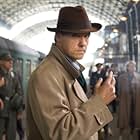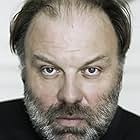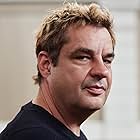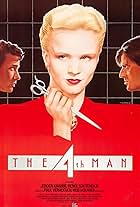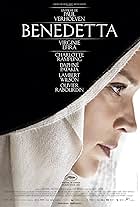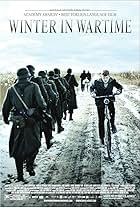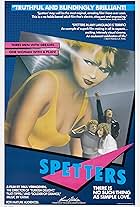Na Holanda ocupada pelos nazistas durante a Segunda Guerra Mundial, um cantor judeu se infiltra na sede regional da Gestapo para a resistência holandesa.Na Holanda ocupada pelos nazistas durante a Segunda Guerra Mundial, um cantor judeu se infiltra na sede regional da Gestapo para a resistência holandesa.Na Holanda ocupada pelos nazistas durante a Segunda Guerra Mundial, um cantor judeu se infiltra na sede regional da Gestapo para a resistência holandesa.
- Direção
- Roteiristas
- Artistas
- Indicado para 1 prêmio BAFTA
- 13 vitórias e 23 indicações no total
Avaliações em destaque
I seem to be the first in the US to comment on this film after having seen it at a regular theater.
There's no sense in talking about the movie's plot as so many others have already done so.
My fiancée is German and tends to be interested in those artsy foreign films. Tonight she decided we should go see this one. I'm glad we did.
I've seen a number of Paul Verhoeven's films and have found some of them quite entertaining, if a bit tacky and unrealistic. I wasn't expecting much from a Dutch film by a guy known for making big budget, tacky films.
I was pleasantly surprised by this film.
Yes, it most certainly IS a Paul Verhoeven film. Gratuitous nudity and violence seem to be his hallmarks and they're certainly not lacking. Do they detract from the movie? A little, but not enough to lose sight of the message of the film - or to make it any less enjoyable.
We had recently seen "The Lives of Others" which starred Sebastian Koch. It made his character oddly familiar. I'm certainly a fan of his after seeing his performance in both of these movies.
As for Carice van Houten... well, one of the marks of a true STAR is that you just can't take your eyes off of him or her. It isn't just beauty; there are plenty of beautiful women in the world who don't possess that same star quality. It isn't just talent, either; there are many very talented actresses out there who just don't draw you in in the same way. Carice van Houten has it all: she's beautiful in a very real way and an amazing talent - and has that something special that makes you look at her every second she's on screen. I hope the directors of the world take note of her because she deserves the stardom she has exhibited in this film.
It is good to see a film that depicts how the hunted can easily turn into the hunter. My fiancée's mother was a young girl during WWII who's family lived in Poland (near Gdansk aka Danzig). Towards the end of the war, they were forced to leave their home in fear for their lives - both from the advancing Russians and the local Poles exacting revenge for what other Germans had done. The film said it in a slightly different sentence, but it is right in bringing across the message that people seem to never learn: that it is NEVER right to hurt others no matter what they might have done in the past.
I wonder if Paul Verhoeven's family is Jewish because he really seems to identify with the never ending succession of attacks against the Jewish people. It saddens me that only ONE other review even mentioned the scene at the end where Rachel's community (in Israel) was being attacked. Part of the film's message is that we seemed doomed to repeat our inhumanity to our fellow man.
Was this a perfect movie? Certainly not. Is it a masterpiece ala "Schindler's List" or "Full Metal Jacket" or "Saving Private Ryan?" Probably not. But I'll say that in the several hours since I've seen it, I can't stop thinking about it. And I certainly enjoyed every minute of that 2-1/2 hour film while watching it. I'd watch it again if I had it on DVD.
There's no sense in talking about the movie's plot as so many others have already done so.
My fiancée is German and tends to be interested in those artsy foreign films. Tonight she decided we should go see this one. I'm glad we did.
I've seen a number of Paul Verhoeven's films and have found some of them quite entertaining, if a bit tacky and unrealistic. I wasn't expecting much from a Dutch film by a guy known for making big budget, tacky films.
I was pleasantly surprised by this film.
Yes, it most certainly IS a Paul Verhoeven film. Gratuitous nudity and violence seem to be his hallmarks and they're certainly not lacking. Do they detract from the movie? A little, but not enough to lose sight of the message of the film - or to make it any less enjoyable.
We had recently seen "The Lives of Others" which starred Sebastian Koch. It made his character oddly familiar. I'm certainly a fan of his after seeing his performance in both of these movies.
As for Carice van Houten... well, one of the marks of a true STAR is that you just can't take your eyes off of him or her. It isn't just beauty; there are plenty of beautiful women in the world who don't possess that same star quality. It isn't just talent, either; there are many very talented actresses out there who just don't draw you in in the same way. Carice van Houten has it all: she's beautiful in a very real way and an amazing talent - and has that something special that makes you look at her every second she's on screen. I hope the directors of the world take note of her because she deserves the stardom she has exhibited in this film.
It is good to see a film that depicts how the hunted can easily turn into the hunter. My fiancée's mother was a young girl during WWII who's family lived in Poland (near Gdansk aka Danzig). Towards the end of the war, they were forced to leave their home in fear for their lives - both from the advancing Russians and the local Poles exacting revenge for what other Germans had done. The film said it in a slightly different sentence, but it is right in bringing across the message that people seem to never learn: that it is NEVER right to hurt others no matter what they might have done in the past.
I wonder if Paul Verhoeven's family is Jewish because he really seems to identify with the never ending succession of attacks against the Jewish people. It saddens me that only ONE other review even mentioned the scene at the end where Rachel's community (in Israel) was being attacked. Part of the film's message is that we seemed doomed to repeat our inhumanity to our fellow man.
Was this a perfect movie? Certainly not. Is it a masterpiece ala "Schindler's List" or "Full Metal Jacket" or "Saving Private Ryan?" Probably not. But I'll say that in the several hours since I've seen it, I can't stop thinking about it. And I certainly enjoyed every minute of that 2-1/2 hour film while watching it. I'd watch it again if I had it on DVD.
I must admit that I don't like to watch dutch movies that much. Most of the time the acting is pretty bad and if they use some kind of cgi in the movies its one from the 1980's.
This movie really surprised me. Quite good acting from most of the actors. And the general view of the Alliance is good and the Germans are bad isn't presented. The movie shows both sides, the good the bad (and the ugly) behaviors of the people during the war.
Although he didn't have a very big budget to make this movie (between 16-20 million dollars) which is nothing for Hollywood matters, he'd made quite a good movie from it.
If you want to watch a movie about WWII that isn't like most of the movies made about this war, go and watch this one. You wont be bored for the next 2,5 hours.
This movie really surprised me. Quite good acting from most of the actors. And the general view of the Alliance is good and the Germans are bad isn't presented. The movie shows both sides, the good the bad (and the ugly) behaviors of the people during the war.
Although he didn't have a very big budget to make this movie (between 16-20 million dollars) which is nothing for Hollywood matters, he'd made quite a good movie from it.
If you want to watch a movie about WWII that isn't like most of the movies made about this war, go and watch this one. You wont be bored for the next 2,5 hours.
It took me about an hour after having seen the film to find any enthusiasm to write this review. The film Black Book, or Zwartboek in Dutch, is very impressive, with an excellent feeling for the complexity of inter-human relationships.
The story is about a Jewish girl that finds herself in a powerless situation in a war that tends to bring out the worst in all, 'good' or 'bad'. So much for what we know without seeing the film for ourselves. The film starts out rather typical, informing us with what we already new about the war: people where poor, hungry and trying to survive. However, the second part of the film shows a less well known part of Dutch resistance history: that the war brings out the worst in everybody. Without losing sight of the importance of the resistance against the foreign repression, Paul Verhoeven confuses his audience by visualizing how ones own well-being seems to go at the cost of the well-being of another. No black and white, no bad or good, but only the individual choice, that is tormented by the will to survive and a feeling for morality.
The film is daring for showing the dark side of the Dutch national history. However, the most valuable of the film is that it captivates its audience and sensitizes its audience for the misery of the historical event of World War II, but also the contemporary difficulties that affects human beings rather than countries. A must see, even though it makes you feel miserable.
The story is about a Jewish girl that finds herself in a powerless situation in a war that tends to bring out the worst in all, 'good' or 'bad'. So much for what we know without seeing the film for ourselves. The film starts out rather typical, informing us with what we already new about the war: people where poor, hungry and trying to survive. However, the second part of the film shows a less well known part of Dutch resistance history: that the war brings out the worst in everybody. Without losing sight of the importance of the resistance against the foreign repression, Paul Verhoeven confuses his audience by visualizing how ones own well-being seems to go at the cost of the well-being of another. No black and white, no bad or good, but only the individual choice, that is tormented by the will to survive and a feeling for morality.
The film is daring for showing the dark side of the Dutch national history. However, the most valuable of the film is that it captivates its audience and sensitizes its audience for the misery of the historical event of World War II, but also the contemporary difficulties that affects human beings rather than countries. A must see, even though it makes you feel miserable.
I attended the North American premiere of "Black Book" at the Toronto International Film Festival. Although my main interest lies in independent film, and I did see many indies as well as foreign films and documentaries in Toronto, I also saw a few of the "Gala" selections. Of those "big movies" on my list, the one which impressed me the most was this Dutch production from Paul Verhoeven. Set in Nazi-occupied Holland during World War II, the film centers around a young Jewish woman named Rachel, who changes her name (and hair, and personality, and more) to Ellis and enters an odyssey of determination and sheer luck in an effort to survive what would otherwise be certain death.
Make no mistake about it: this is an epic in the true sense of the word. The visuals are stunning. Everything about the production from the sound to the effects to the score says "big budget." The story is chock full of more twists and turns than just about any film I've seen in this genre. And just when you think that, perhaps, Verhoeven is beginning to stretch the bounds of credulity, you realize (at the end credits, if not before) that "Black Book" is based on fact.
Most of all, the film's power is due to the magnificent acting of Carice van Houten. Her Rachel/Ellis is a character so unique, so original, that it holds up against the great heroines of contemporary cinema. Combine her marvelous performance with a wonderful story and superb production values and you end up with a thrill ride from start to finish. "Black Book" left me breathless.
Make no mistake about it: this is an epic in the true sense of the word. The visuals are stunning. Everything about the production from the sound to the effects to the score says "big budget." The story is chock full of more twists and turns than just about any film I've seen in this genre. And just when you think that, perhaps, Verhoeven is beginning to stretch the bounds of credulity, you realize (at the end credits, if not before) that "Black Book" is based on fact.
Most of all, the film's power is due to the magnificent acting of Carice van Houten. Her Rachel/Ellis is a character so unique, so original, that it holds up against the great heroines of contemporary cinema. Combine her marvelous performance with a wonderful story and superb production values and you end up with a thrill ride from start to finish. "Black Book" left me breathless.
Director Paul Verhoeven's self-confessed aim is to combine art and business, appeal to a broad audience, and yet still have some endurance. The fame of films like Basic Instinct and Total Recall is lasting, yet they court criticism with their use of sexuality or by playing to the (easily dismissible) sci-fi genre. Graphic sex and violence are common in his movies and, when you add the occasional major flop such as Showgirls, the work of Verhoeven often fails to be taken seriously. Yet Black Book deserves respect. It is a wartime resistance movie on an epic scale, freed of the conventions of British and American war movies, yet bringing their typically high production values to a uniquely Dutch film.
Israel 1956. A Holy Land Tours bus stops off at a Kibbutz. One of the passengers recognises a teacher there, Rachel, from times they had shared during the war. As her friend leaves, Rachel thinks back to Holland in 1944. She was an accomplished cabaret singer but also Jewish. She was in hiding, waiting for the war to end. But chance misfortune means she has to try to make a getaway with some other Jewish people. They are ambushed, and she is almost shot. A little later she starts working for the resistance ('terrorists' as the Nazis call them) and infiltrates the Gestapo, seducing a high ranking officer called Muntze.
What follows is a frantic game of cat and mouse, espionage and counter-espionage. Rachel (now called Ellis) is torn between the horrors inflicted on her friends close-by and the elaborate deceits she tries to play to save them. Gradually it becomes clear that Muntze, anticipating the end of the war, is risking his neck to try to minimize death and suffering on both sides, and one or more of the resistance fighters is selling out to the Nazis to reap rich profits. Muntze, like Rachel, has had to overcome great losses. Their humanity is a bridge that brings them closer.
Rachel/Ellis is played by Carice van Houten, a leading actress of the Dutch screen. Her presence is luminous and charismatic (for British/American audiences, there is the curious sensation of watching someone unknown who radiates star quality with every breath). Her character has to adapt to many contrasting situations yet there is an underlying determination and fast thinking that shines through and makes such changes seem in character and unscripted. We share her emotional struggle and watch her pit her wits against the Gestapo (who are not exactly stupid). The movie is worth seeing for her performance alone.
On the one hand, the film has been minutely researched, based on actual events and characters; on the other it still has the slightly larger than life gloss we might associate, say, with a James Bond film. The escapes are in the nick of time, the sex scenes are steamy, and the plot twists increase exponentially as we get closer to the end.
Not content to portray the unique conditions of Holland during the occupation, Black Book goes on to catalogue post war atrocities and Rachel's eventual journey to Israel. The style and delivery will not appeal to everyone, but Black Book is Verhoeven on top form, delivering grand entertainment that shows his talents (and those of the remarkable Carice van Houten) at their finest.
Israel 1956. A Holy Land Tours bus stops off at a Kibbutz. One of the passengers recognises a teacher there, Rachel, from times they had shared during the war. As her friend leaves, Rachel thinks back to Holland in 1944. She was an accomplished cabaret singer but also Jewish. She was in hiding, waiting for the war to end. But chance misfortune means she has to try to make a getaway with some other Jewish people. They are ambushed, and she is almost shot. A little later she starts working for the resistance ('terrorists' as the Nazis call them) and infiltrates the Gestapo, seducing a high ranking officer called Muntze.
What follows is a frantic game of cat and mouse, espionage and counter-espionage. Rachel (now called Ellis) is torn between the horrors inflicted on her friends close-by and the elaborate deceits she tries to play to save them. Gradually it becomes clear that Muntze, anticipating the end of the war, is risking his neck to try to minimize death and suffering on both sides, and one or more of the resistance fighters is selling out to the Nazis to reap rich profits. Muntze, like Rachel, has had to overcome great losses. Their humanity is a bridge that brings them closer.
Rachel/Ellis is played by Carice van Houten, a leading actress of the Dutch screen. Her presence is luminous and charismatic (for British/American audiences, there is the curious sensation of watching someone unknown who radiates star quality with every breath). Her character has to adapt to many contrasting situations yet there is an underlying determination and fast thinking that shines through and makes such changes seem in character and unscripted. We share her emotional struggle and watch her pit her wits against the Gestapo (who are not exactly stupid). The movie is worth seeing for her performance alone.
On the one hand, the film has been minutely researched, based on actual events and characters; on the other it still has the slightly larger than life gloss we might associate, say, with a James Bond film. The escapes are in the nick of time, the sex scenes are steamy, and the plot twists increase exponentially as we get closer to the end.
Not content to portray the unique conditions of Holland during the occupation, Black Book goes on to catalogue post war atrocities and Rachel's eventual journey to Israel. The style and delivery will not appeal to everyone, but Black Book is Verhoeven on top form, delivering grand entertainment that shows his talents (and those of the remarkable Carice van Houten) at their finest.
Você sabia?
- CuriosidadesMost actors speak more than one language in the film. Carice van Houten speaks four languages fluently in the course of the film: Hebrew in the scenes in Israel, German with Nazi soldiers, English with Canadian army personnel and Dutch for the majority of the film.
- Erros de gravaçãoInsulin, even injected directly into the blood stream, would not act as fast as shown to lower blood sugar.
- Citações
Rachel Stein aka Ellis de Vries: I never knew this would happen. To fear the liberation...
- ConexõesEdited into Zwartboek: The Special (2006)
- Trilhas sonorasIch bin die fesche Lola
Music by Friedrich Hollaender (as Friedrich Hollaender)
Lyrics by Robert Liebmann
Performed by Carice van Houten
(c) 1930 by Ufaton-verlagsgesellschaft mbH (BMG Music Publishing Germany), Munich
Principais escolhas
Faça login para avaliar e ver a lista de recomendações personalizadas
Detalhes
- Data de lançamento
- Países de origem
- Centrais de atendimento oficiais
- Idiomas
- Também conhecido como
- La lista negra
- Locações de filme
- Empresas de produção
- Consulte mais créditos da empresa na IMDbPro
Bilheteria
- Orçamento
- US$ 21.000.000 (estimativa)
- Faturamento bruto nos EUA e Canadá
- US$ 4.398.532
- Fim de semana de estreia nos EUA e Canadá
- US$ 112.521
- 8 de abr. de 2007
- Faturamento bruto mundial
- US$ 26.768.563
- Tempo de duração2 horas 25 minutos
- Cor
- Mixagem de som
- Proporção
- 2.35 : 1
Contribua para esta página
Sugerir uma alteração ou adicionar conteúdo ausente












